THE CIRCLE OF LIFE
Do No Harm, The Greater Good, Born to Run
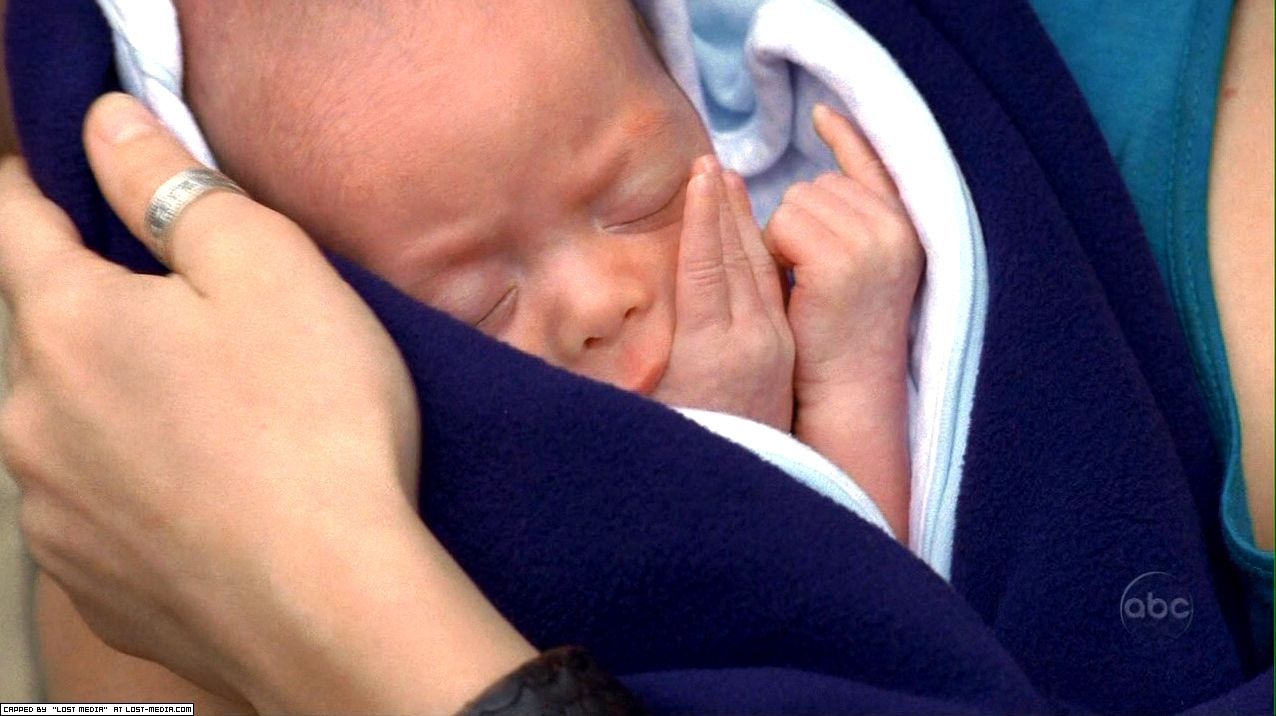
- Dhammavadaka
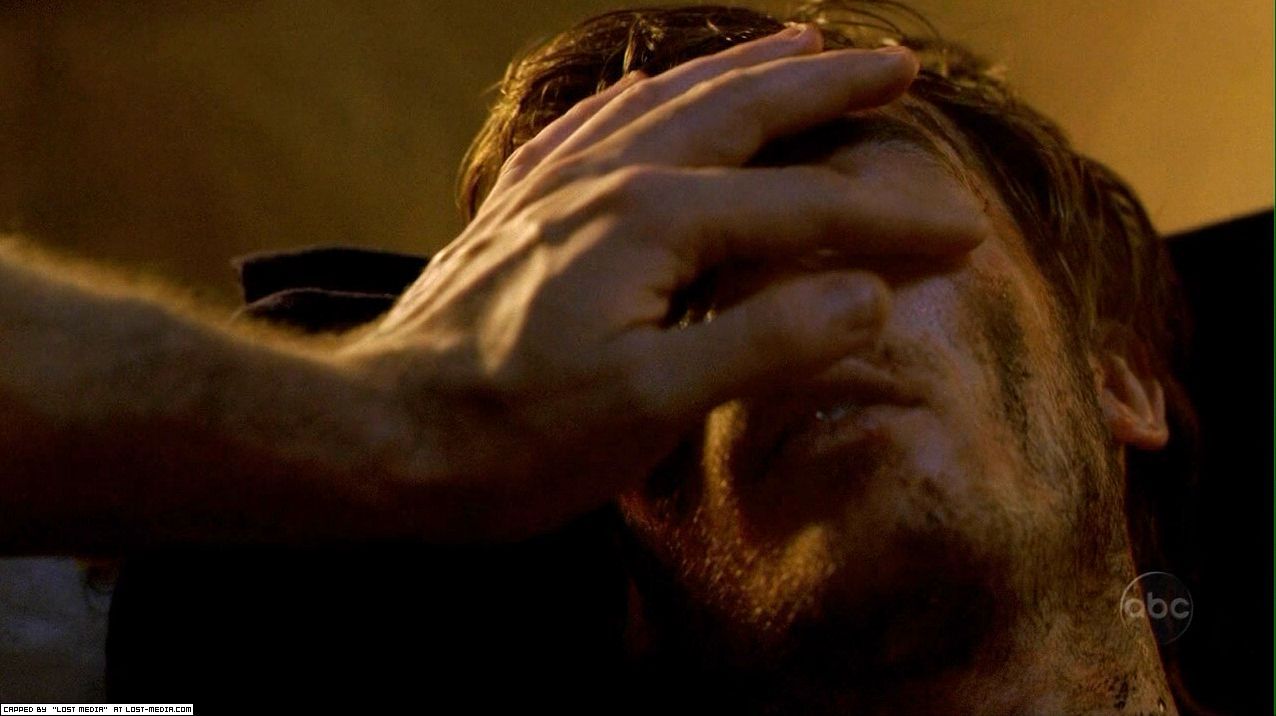
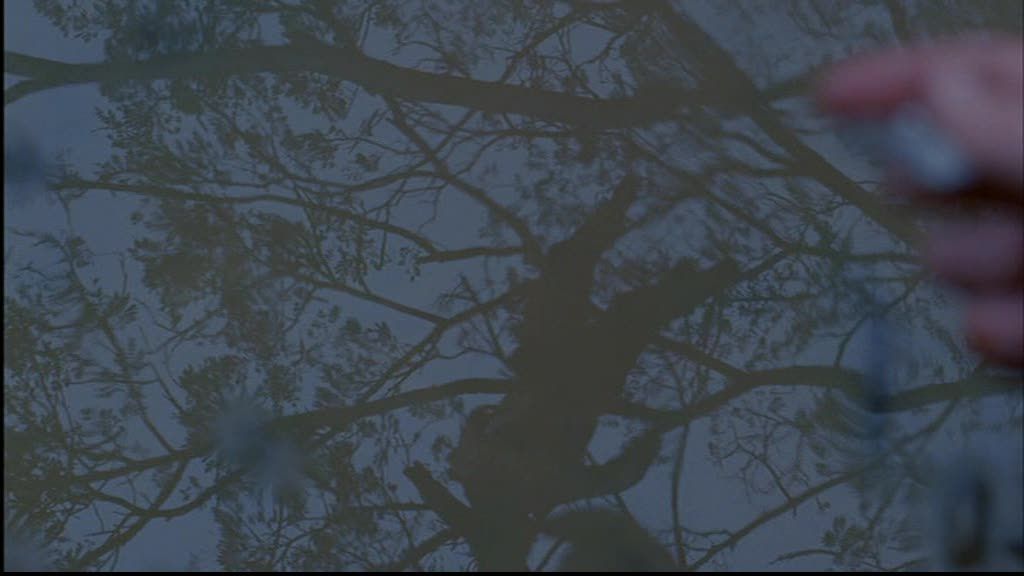
... to the merely gruesome ...
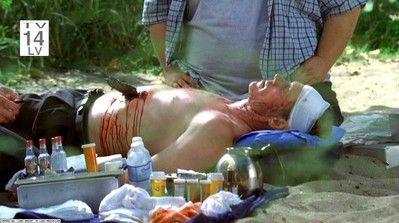
... all the way down to "who the hell was she?"
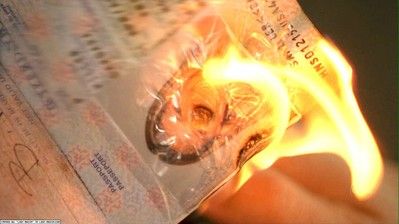
Boone's death was different. It was more like a real death because we had come to know Boone, to like him. It seemed like he had just started on his own hero's journey, the classic boys-to-men hero's arc, when suddenly - WAP! He was gone. In the blink of an eye. It was a reminder that death could happen at any time to any one of us, no matter how healthy and young and pretty and rich.
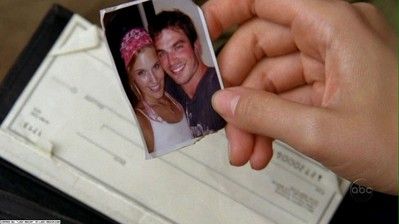
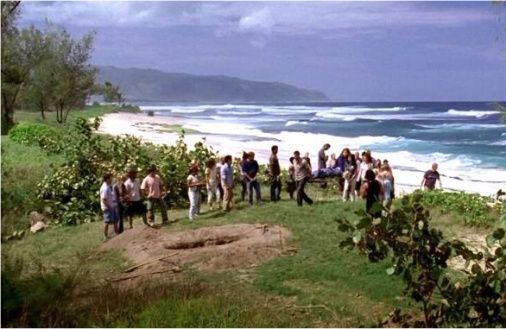
Even though not every death has earned the same tribute as Boone's did, death has always been an important character on LOST. The circle of life spins constantly, as it does for all of us. We are all born to strangers known as our fathers and mothers.
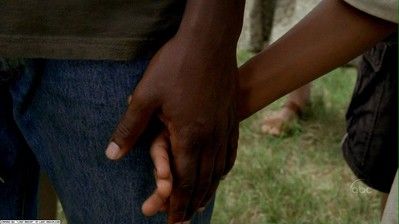
Who twist us into tangled mirror images of themselves.
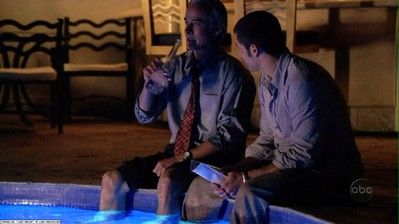
In the beginning, it's all fun and games. We go out into the world.
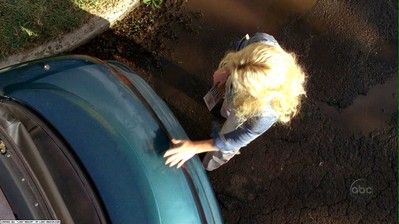
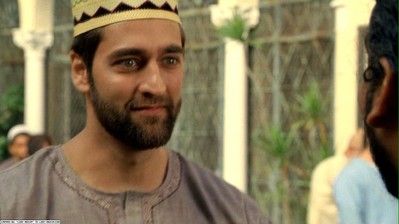
We fall in love. Some of us even get married.
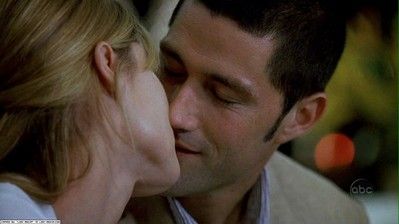
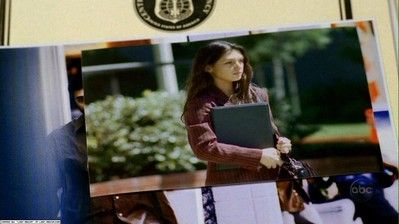
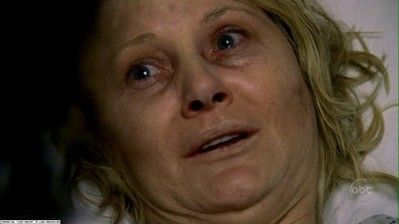
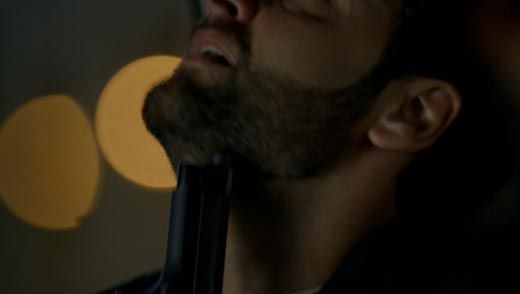
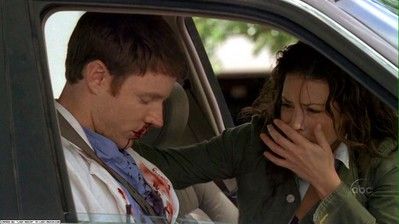
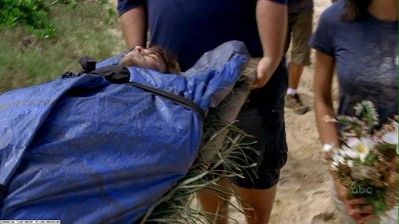
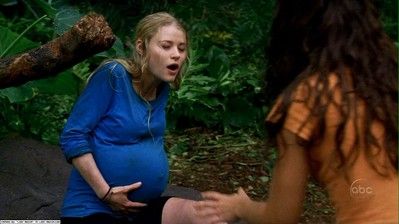
It's not a pretty picture. Basically life's a bitch and then you die. And then life's a bitch all over again.
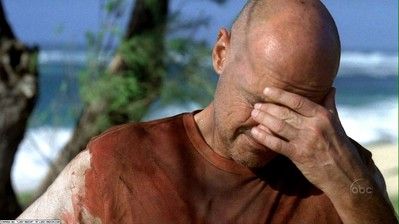
The fragility of life is what makes us cling to it. We cling even though it so often brings suffering, even though we know we are all destined in the end to lose it. Hindus and Buddhists have a name for this vicious cycle we're all trapped in - Samsara, the eternal round of birth and death. And as colorfully as it is portrayed in this picture, it's meant to be seen as more of a revolving door prison than a happy merry go round.
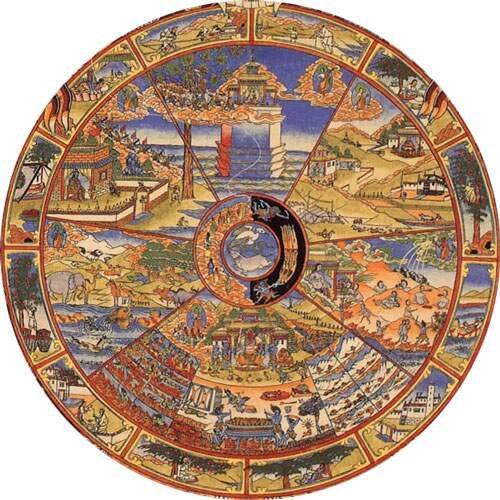
As LOST fans we are extremely familar with the idea of vicious cycles. And of circles within circles, wheels within a wheel.

This is a story where the last three season finales have all had cliffhangers hinged upon the same inanimate object.
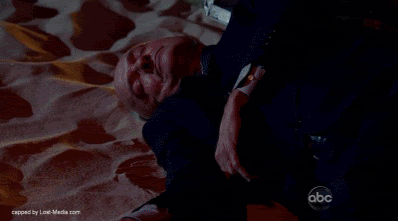
It's astonishing sometimes to realize that since the gamechanging Season Three finale, as the characters have hopscotched all over time and space and imagination, our story has only budged forward a couple of days, something less than a week. It has been everywhere and gone nowhere. Like a loop.
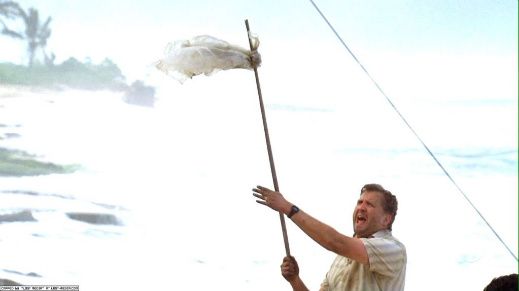
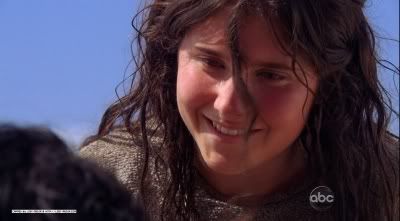
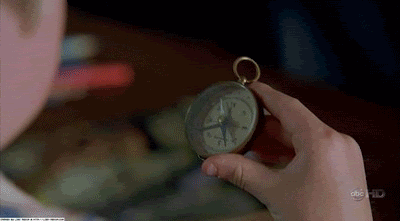
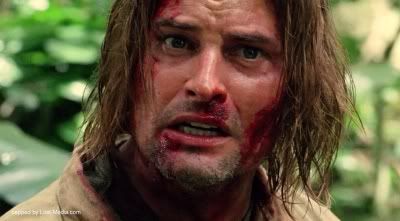
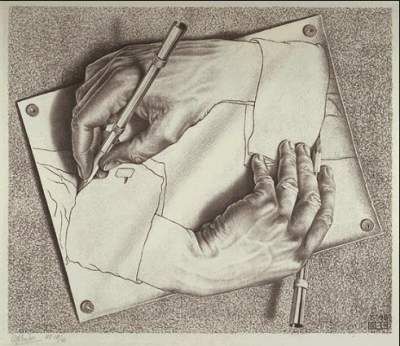
"not a physical circuit but an abstract loop in which, in the series of stages that constitute the cycling-around, there is a shift from one level of abstraction (or structure) to another, which feels like an upwards movement in a hierarchy, and yet somehow the successive "upward" shifts turn out to give rise to a closed cycle. That is, despite one's sense of departing ever further from one's origin, one winds up, to one's shock, exactly where one had started out. In short, a strange loop is a paradoxical level-crossing feedback loop."
Got that? It sounds complicated but it's as easy to understand as this statement: "I am lying".
If the statement is taken as true, then it immediately becomes false. You can not trust either of your logical conclusions. For instance, how to explain the night in The Little Prince when Sawyer is made witness, so many months after the fact, to the sight of Kate delivering the baby Aaron?
Now Aaron, like each of us, was only born once. That seems irrefutable.
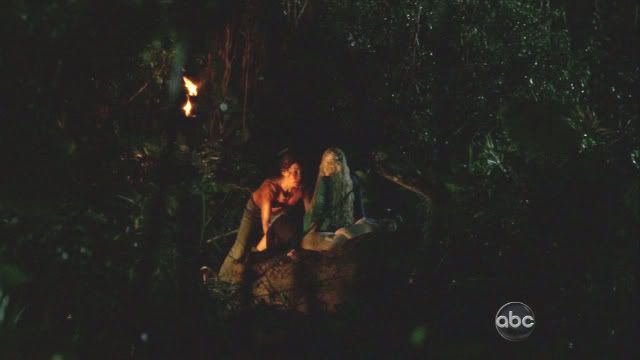
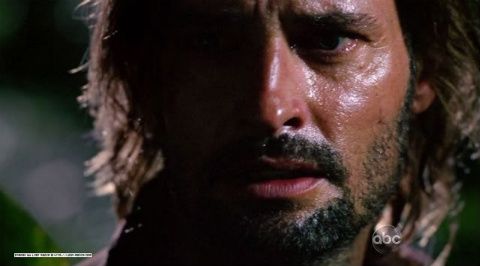
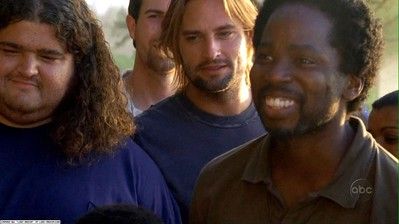
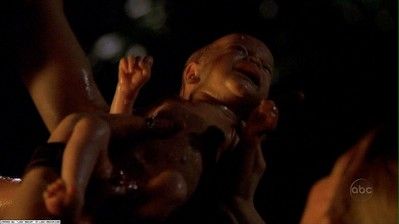
And what about how Sawyer and Locke, unsprung from time when the Island went pooft, watched from afar as the hatchbound Desmond's not-deus leapt out of the machine during their revisit to that same hallowed night?
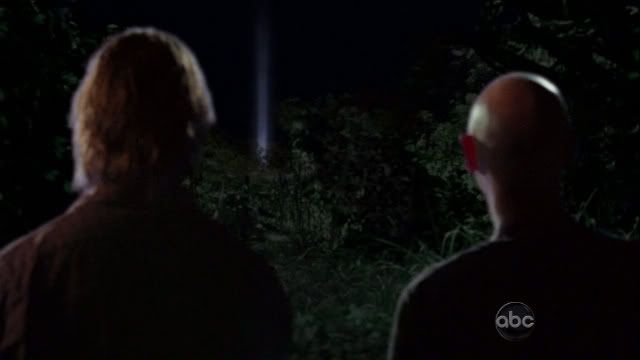
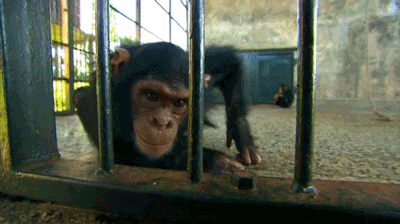
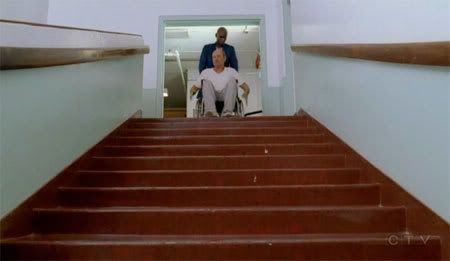
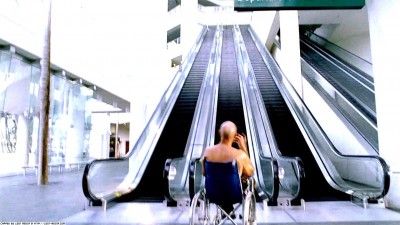

Having gone that far afield, I'll quietly tiptoe back to the episodes at hand, which all happened in a simpler time - back when we all thought LOST was about Jack being a fixer and a saver, a/k/a Good Guy, and Kate being a runner and a criminal, a/k/a Bad Girl. Boy, were we naive!
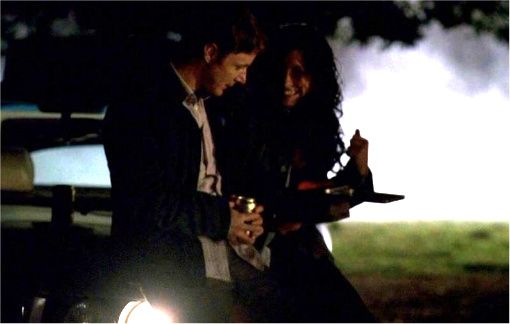
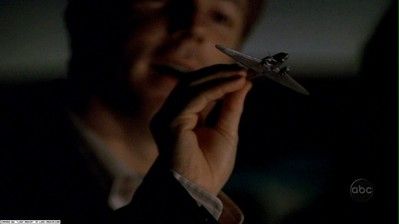

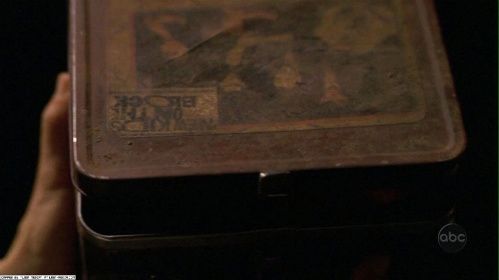
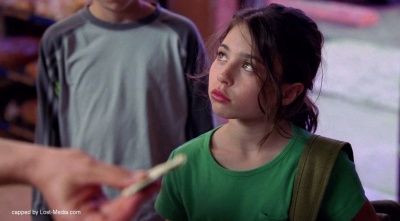
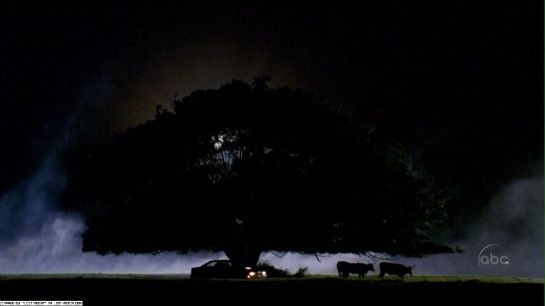
There are odd portents scattered throughout these episodes, such as the mysterious Tree of Life under which Kate and Tom dig up their buried past. And those longhorned bulls, reminiscent of the Brahmin bulls so sacred to Hindus ... what are they doing there? There may be nothing symbolic in any of these things, but the framing is so delicate and lovely and odd. It is the little quiet pictures I find scattered around LOST that intrigue me.
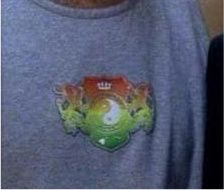
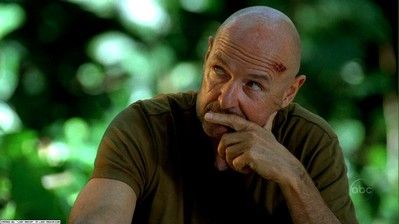
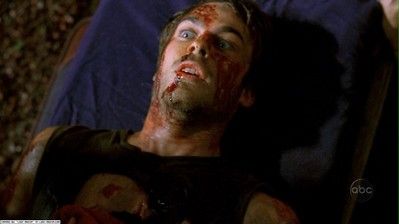
“For certain is death for the born,
And certain is birth for the dead,
Therefore over the lost
Thou shouldst not grieve."
- Bhagavad Gita
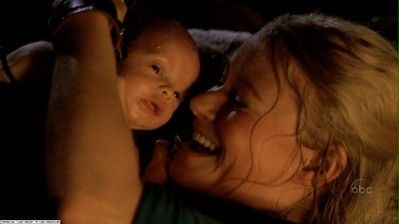
Or as Yoda would put it:
“Death is a natural part of life. Rejoice for those around you who transform into the Force. Mourn them do not. Miss them do not. Attachment leads to jealousy. The shadow of greed, that is.”
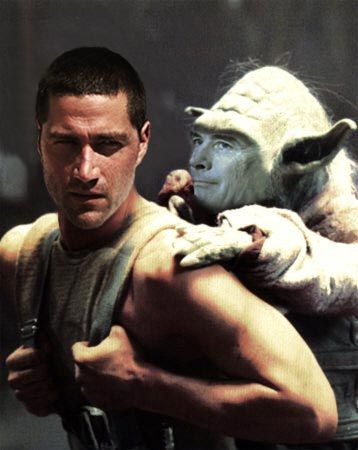
Unfortunately, Jack did not have a Jedi sage sitting on his shoulder. The closest thing he had to a life coach was Drunk Christian and his misanthropic system of self defeating cybernetics.
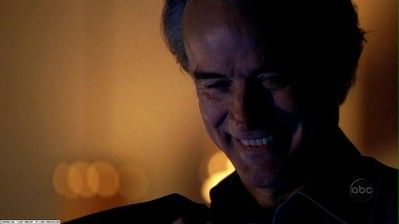
Shephard the Elder offered his son not advice on his wedding day, but a diagnosis: "Commitment is what makes you tick, Jack. The problem is you're just not good at letting go." According to his guru, Jack was so committed to being committed that he was doomed to constant failure.
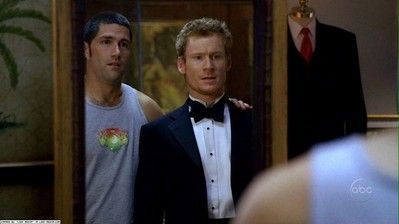
Jack had been committed to his old buddy Mark Silverman for over twenty years. Mark Silverman, you may recall, was last seen not being saved by young Jack Shephard in Jack's first schoolyard bout with heroic malfunction.

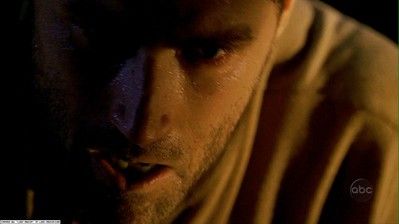
Finally Boone had to rouse himself from his own death throes to put a stop to his own gruesome mutilation, to beg Jack to please just make it stop.
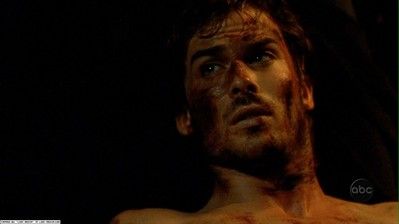
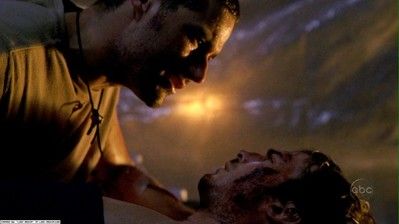
As you may recall, he got rather upset about the whole thing.
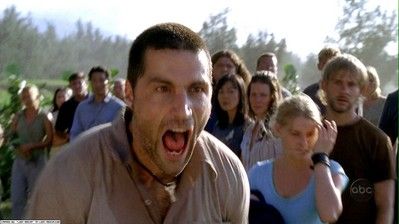
But come on, let's give the guy a break. Wasn't he just being a good doctor? Just fulfilling his Hippocratic Oath, as per the title of the episode? I don't know - maybe, maybe not. We'd seen with Sawyer's torture that the Hippocratic Oath wasn't necessarily Jack's top priority, and we'd see it again in the future when the life of Ben Linus was on the line ... back in the past.

One of the things I personally respect about LOST is the way it constantly challenges our preconceptions. Boone's death was juxtaposed not only with birth in Do No Harm, but with sex,
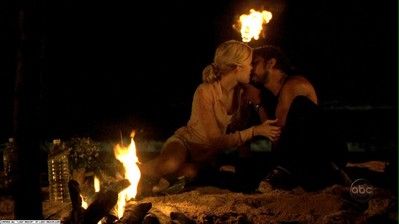
and, most dramatically, with Jack and Sarah's wedding day.
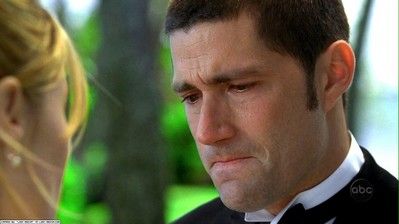
Having sworn to save Boone's life, as Jack was wracked with grief and despair and the crushing realization that he had failed, as Boone gasped out his last ragged breaths,
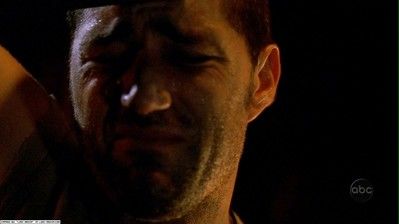
the scene cut, jarringly, to Jack giving his heartfelt and sincere oath to Sarah. To love her. Forever.
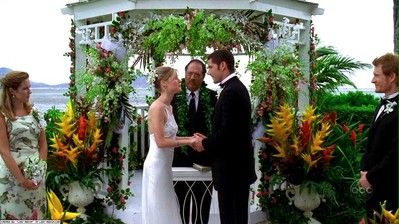
Another solemn oath, vow and sworn promise that ended up meaning exactly nothing. The marriage lasted about two, three years tops, before Jack was kissing another woman, Sarah was in love with a man whose main virtue was not being Jack, Jack was mugging his dad at an AA meeting accusing him of banging his wife, and Sarah was bailing Jack out of the local jail before telling him to please, please, please just get lost. Marriage, American style.

Both of Jack's failed promises stemmed from the same inspiration.
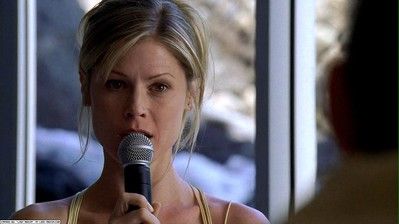
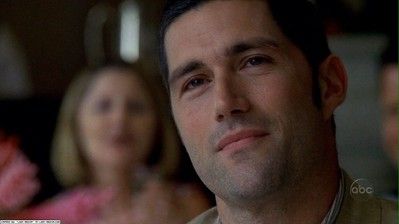
Sarah's hero worship may well have been the only thing Jack did love about her. And maybe there's the rub. How can being a hero, even wanting to be a hero, ever be a bad thing? To the Western way of thinking, where good and bad occupy mutually exclusive compartments on the opposite ends of a clean and tidy moral universe, heroism falls squarely into the good box. A Buddhist might say that such thinking arises from a false premise. We have convinced ourselves that there are good things and bad things and that all happiness depends on avoiding the one and embracing the other. We are lost in the delusion of duality, of the illusion that black and white are mutually exclusive adversaries, rather than mutually dependent equals.
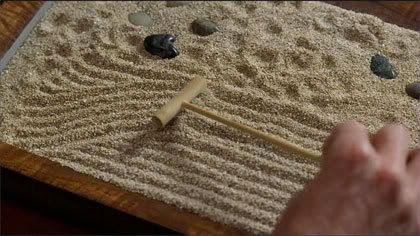
I know in the beginning, it really did seem like we were being sucked into a simplistic black and white metaphor. Like any good magic show, before the magician can deceive us with illusion, he must first divert our attention with a surefire distraction.
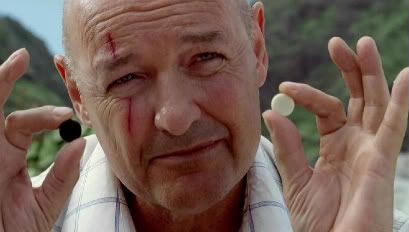
Because, let's face it, when all is said and done, there hasn't been a single morally clear moment in all the series. Every good thing that any character has ever done was been conjoined inextricably with something bad. Locke found the hatch, but he got Boone killed.
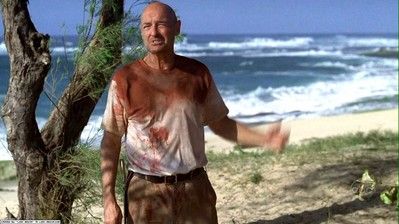
Sun wanted Jin to stay with her because she just remembered she loves him with all her heart, so she tried to poison him...and gutted Michael instead.
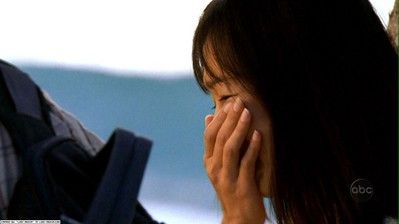
Jack tried valiantly to save Boone, but he went so psychotically overboard, we ended up wondering if perhaps he was not sane.
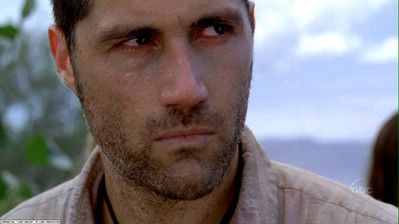
Jack wasn't the only one chasing the Hero's brass ring. Sayid successfully lured Essam to join the Muslim martyrs as a way to become a Hero for Islam.
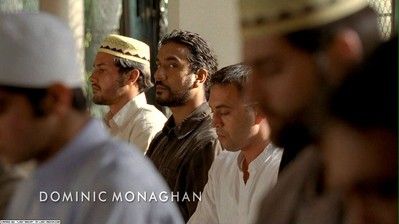
Tom Brennan sat straight up and let himself be driven headfirst into a bullet, trying to be a Hero for Katie.
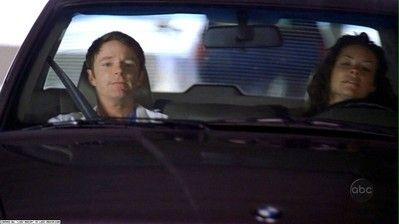
Locke tried to comfort an inconsolable Shannon by assuring her Boone had become a Hero in death.
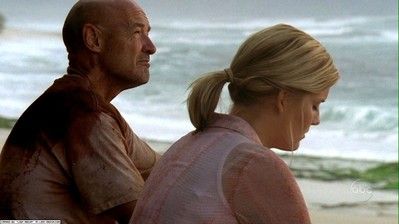
Shannon, unconvinced, tried to become a Hero herself by taking Locke out,
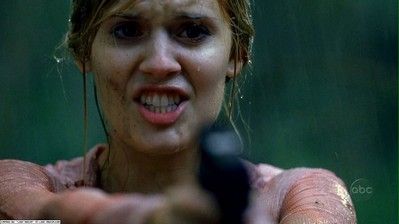
and Sayid broke his promise to Shannon, playing Hero to preserve Locke's life - and his wisdom - for the greater good (he hoped) of all the survivors.
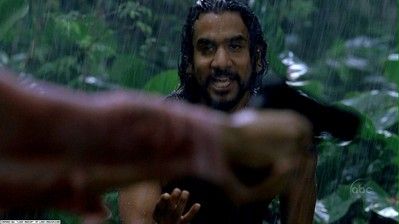
The concept of The Greater Good , the title of Sayid's second flashback, is fundamental to the philosophy of Utilitarianism. And indeed, the founder of Utilitarianism, one Jeremy Bentham, the philosopher whose mummified corpse lives on as the famed Oxford University "autoicon",

was John Locke's nom de plume when he returned to Planet Earth for his predestined execution ...
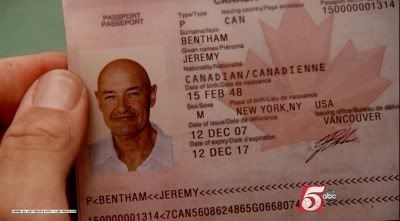
... so that he could die as part of the master plan, for the greater good of his beloved Island.
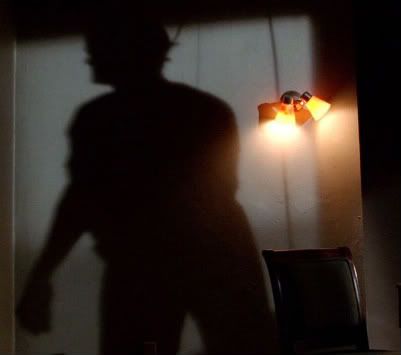

But defining "the greater good" isn't always an easy task, as Sayid discovered. Was Nadia's freedom a greater good than Essam's life?
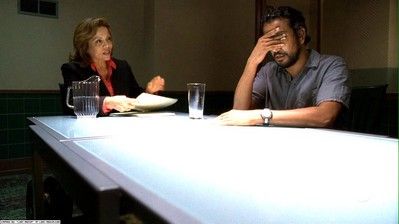
Was helping the US government a greater good than living up to his Muslim ideals? Most importantly, was learning the truth about the hatch a greater good than getting lucky with Shannon?
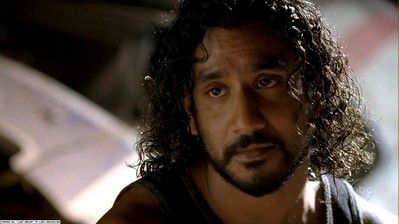
From the start, Sayid's was the most clouded ethical lens. It was obvious early on that he was eminently corruptible. He was willing to deceive and manipulate his dear friend, who he knew to be a peaceful man grieving inconsolably over his wife's murder.
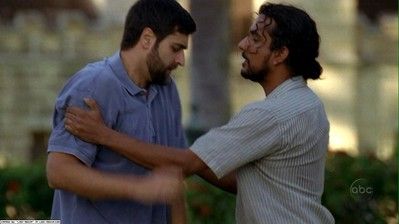
Sayid's treatment of Essam informed us early on that Sayid had the moral flexibility of a snake. It was unforgivable. Yet he nobly chose to stay behind to arrange for proper funeral honors for Essam, and in doing so, he unknowingly marched right onto the fateful Flight 815.

LOST's ubiquitous conflict - Fate vs. Free Will - was muted throughout these episodes, but it wasn't absent. Sayid's smoking, drinking, Half-Life video geek Muslim pals commented that perhaps Fate had brought Sayid to them.
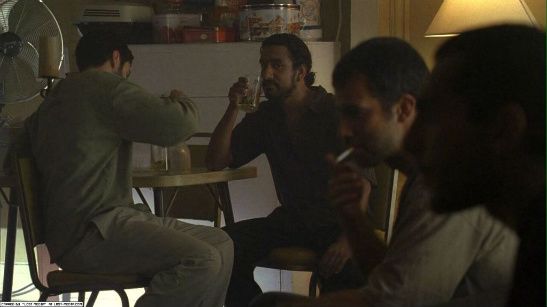
Of course we knew it wasn't Fate, but the Central Intelligence Agency that had brought them together. Sayid was not one to blame things on Fate. When asked, he told Kate that "there is always a choice". He emphasized that "time will make no difference". He begged Shannon not to kill Locke because once it was done, it could never be taken back. Sayid is a rational being, one who trusts in the Laws of Cause and Effect, who embraces the karma of Consequence.
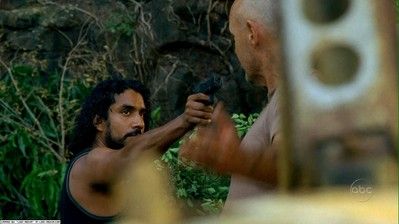
There was however one character on LOST for whom Consequence seemed not to exist. Kate had chosen not to ponder on the great philosophical questions of the ages. She had created a fail safe solution to all of life's problems.

She took off. We didn't yet know at this point what the hell Kate had done, but we were starting to see that, whatever it was, it wouldn't be Kate who would end up bearing the consequences.
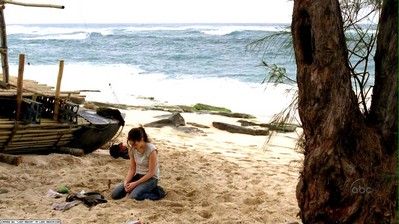
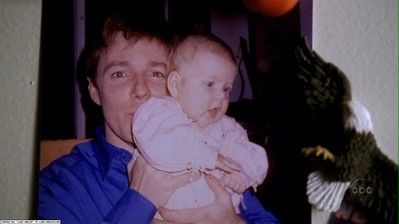
Nadia was the one who suffered the karmic curse of Essam's dying wish, not Sayid.
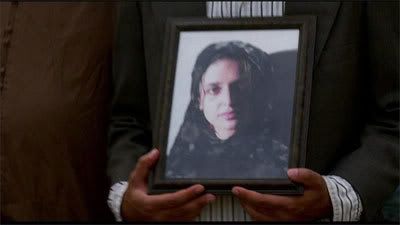
Essam was a distraught husband caught in the crossfire of Sayid's karma, convinced by Sayid's argument that "there need to be consequences" for the death of his wife. If there were no consequence, Sayid explains, it would be as if her death meant nothing, as if it were just passively accepted.
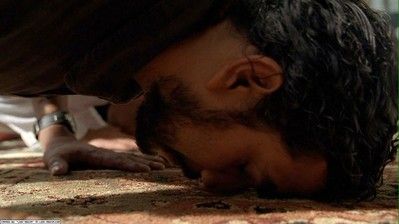
But passive acceptance of Fate seems to be the only option, no matter how actively you work against it. Sayid believed the lack of an outside handle proved the hatch was "not meant to be opened." And yet opened it would be.
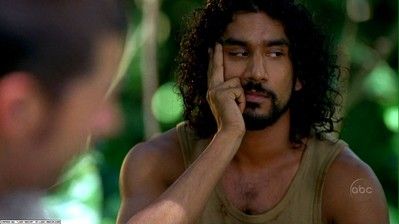
Walt, in his Chucky voice, warned Mr. Locke not to "open that thing". But Locke decided to ignore the little psychic, just this once. Walt may have known the future, but he couldn't stop whatever would happen from happening.
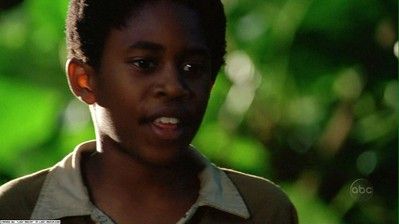
Now that we do know the future, we can see Fate's fingerprints all over these episodes. Which is not the same thing as knowing what it is we have seen.
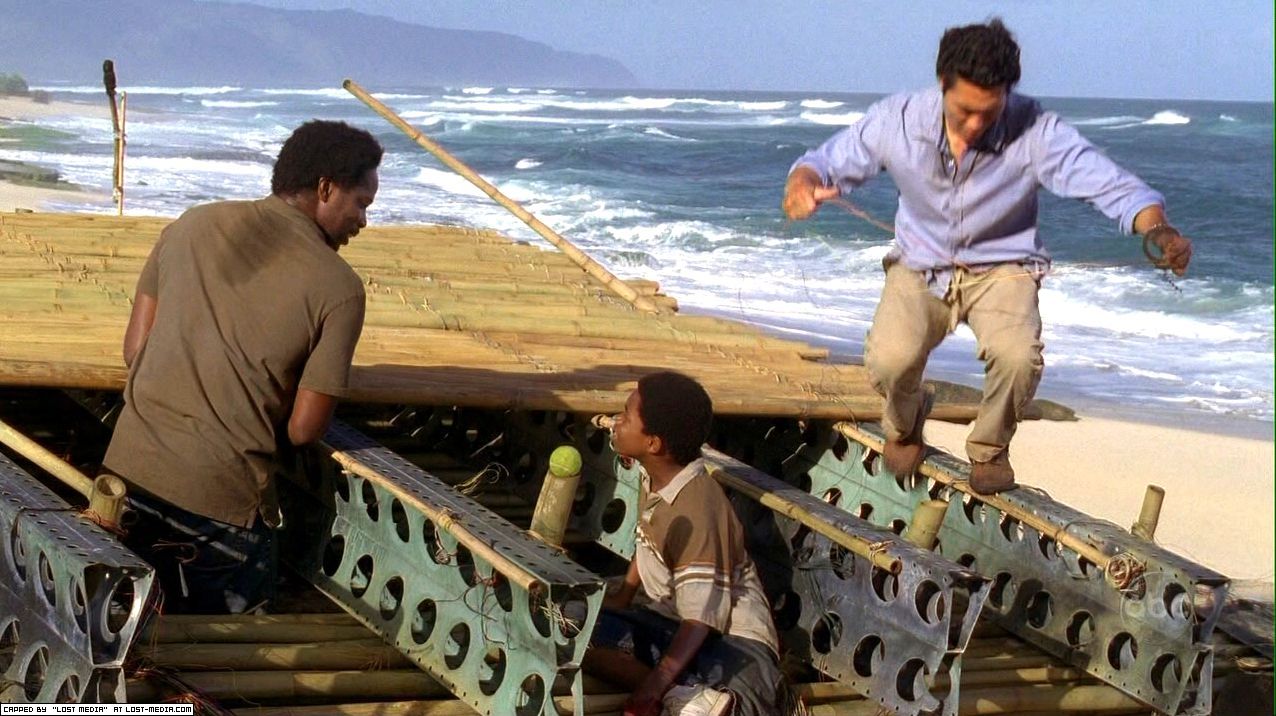
Michael worked heroically to build the raft so that they could escape from the Island and send back help. Watching him work, Walt worried that the raft would sink, that there would be sharks and that they might die.
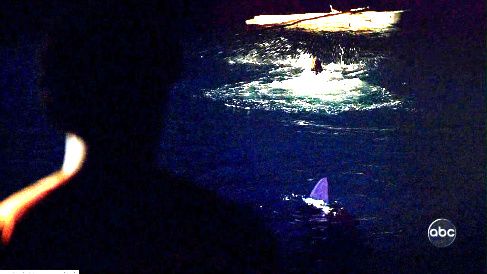
And one by one, for Michael at least, all those things came true.
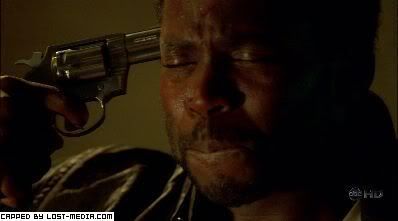
Charlie couldn't give up his dream of fame and fortune, imagining that this Island adventure would only enhance his celebrity. Maybe he could try and top the success of You All Everybody with his new instant classic, The Monster Ate the Pilot.

And he did get part of what he wanted. The helicopters did come.

Some of them did become wicked famous.
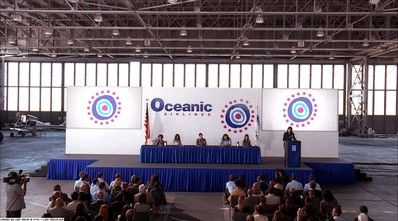
Unfortunately, as we know, Charlie wasn't one of them.
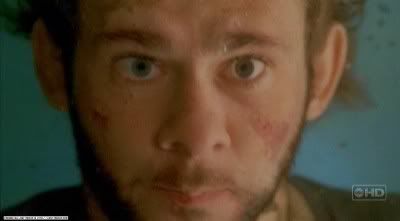
Kate delivering the baby she would one day raise was Fate at its most heavy handed.
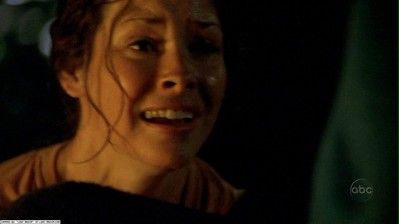
She called him "all of ours",
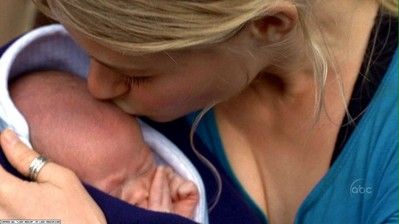
but never did we imagine that Kate was the one he'd grow up calling "Mommy".
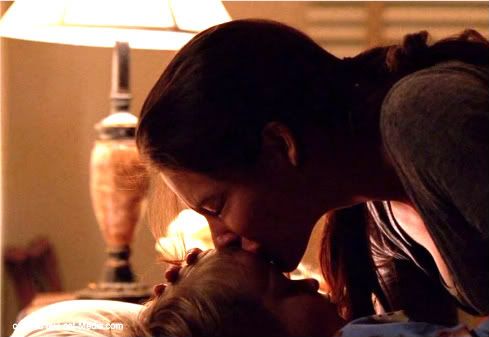
Why was Sawyer's voice the only one that could soothe the frazzled newborn?
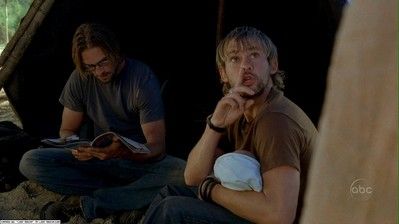
Was that somehow connected to the reason that Sawyer would in future return to the past to witness Aaron's birth? Or was it just another excuse to show us how cute he looked in glasses?
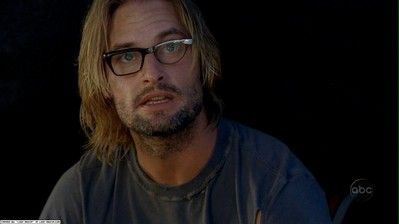
Sarah wearing pyjamas with the number 44, in the episode where the number of the survivors dwindled to 44, was perhaps an inside joke.
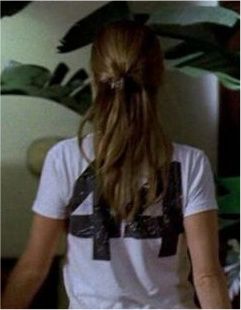
But what about Charlie misspeaking the lyrics to the Eentsy Weentsy Spider so that the spider
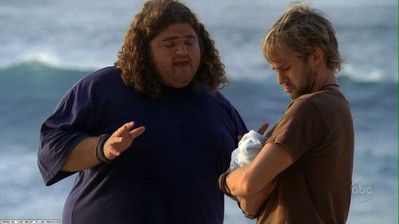
... drowned?
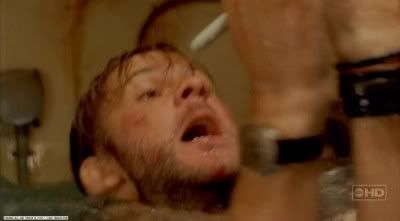
Is it my imagination or does Jack's "among us but not of us" tattoo

look a bit like this part of Jacob's tapestry?
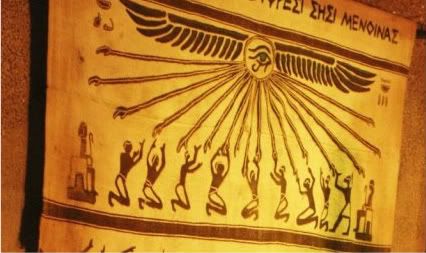
Arzt made the series' first reference to Antarctica in his weather lecture on the beach. There have since been numerous other references to the southernmost continent. Meaningful, or just an ice cold red herring?
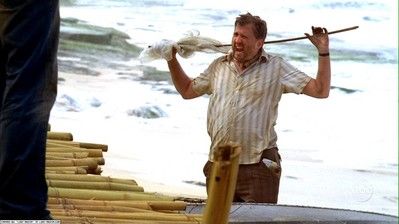
Why was the baseball from Kate and Tom's time capsule signed by "John Locke"?
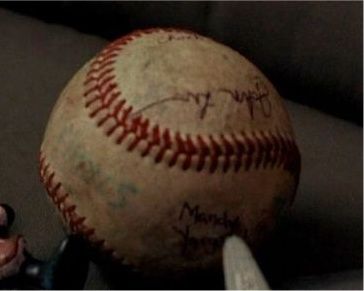
And speaking of baseball, how clever was it of the writers to come up with the name Aaron for the baby born on the night that Boone died?
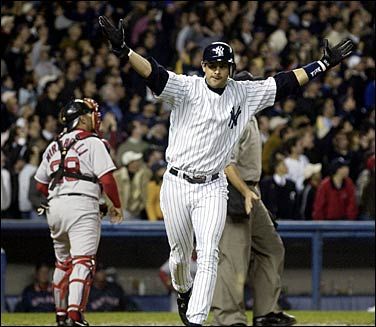
It might not be common knowledge but in the fall of 2003, about a year before the LOST Pilot, while the the Curse of the Bambino was still holding the hapless Boston Red Sox in its endless loop of failure, there was a big bad NY Yankee named Aaron Boone, who hit an 11th inning home run to rob the Sox of the American League championship. I'm not sure why we keep getting all these baseball hints. Maybe it's because baseballs have 108 stitches. Maybe it's because Carlton Cuse spent a lot of time at Fenway when he was at Harvard. But the twist I like on this particular Easter Egg is that Aaron Boone wasn't another spin around the loop of failure for Boston. He was the last big heartbreak. He was, in a way, the loophole.
Trying to decipher and decode the clues of LOST is, for me, the biggest fun of being a fan, even if it is completely futile. Five full seasons in and less than two months from the premiere of Season Six, I feel almost as clueless as ever. When Locke tells Sayid that the rest of the survivors "were all so focused on getting off the island that you weren't seeing things clearly", it sounds like a description of the same well set trap that we've all fallen into. We've all been looking and looking so hard we didn't notice we weren't seeing anything.
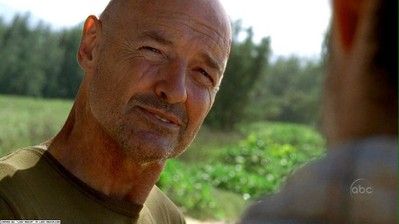
In Eastern philosophies, the reason that mankind suffers is simple - it is Ignorance that blinds us. On LOST, we are kept ignorant through misleads and bluffs and sleight of hand, as we watch our characters stumble about in the ignorance created by their ever expanding web of secrets and lies. Jack knew that Sun had poisoned Michael because she'd really wanted to poison Jin, but he didn't know that Kate was the poison expert who had taught the herbalist Sun how to go about it - even though Kate had just poisoned him the day before.
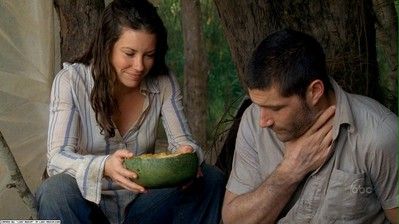
Hurley knew that Kate was the criminal the Marshall had been escorting on the plane, and he let it spill in front of Locke, who didn't know that Jack had known all along, and none of us knew yet what it was that she had done. It was easy to understand Hurley's frustration when he said, "How am I supposed to keep straight who knows what around here?"
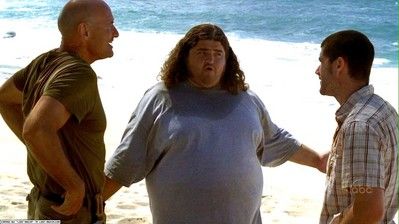
It's a question we LOST fans ask ourselves all the time.
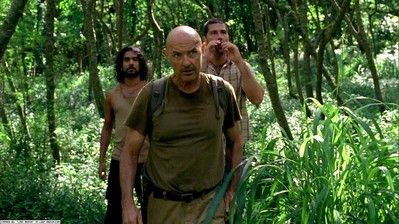
But what made these particular episodes striking, I think, was the amount of actual truth that managed to be uncovered. Sun told Jack about poisoning Jin. Walt told Michael about burning the raft. Locke admitted to Sayid that he'd been the one who beaned him back when he was trying to triangulate the signal. But most importantly, the truth finally came out about the Hatch.

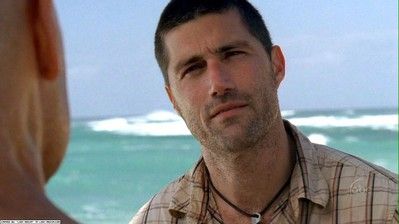
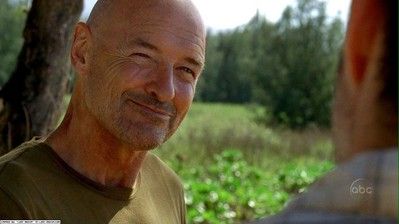
Knowledge is power, after all, and Jack and John's confrontation over who got to control the Island information highway was a great scene, a kind of heavyweight bout between the Island's Alpha twins.
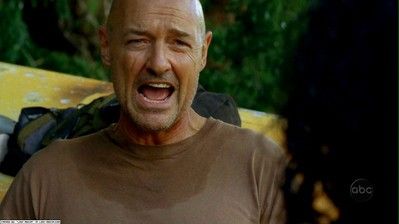
Locke and Sayid's rumble in the jungle had a different feel to it.
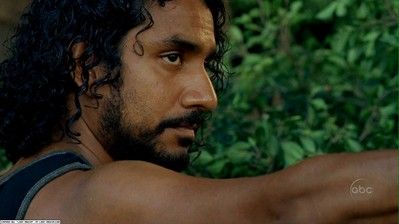
It was more like a ju jitsu match. Locke was cagey, and smart, and tried to play his hand as best he could,
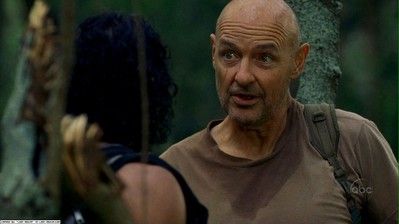
but in the end Sayid was the more agile fighter.
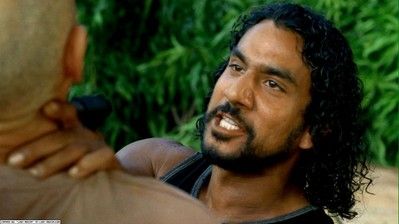
He zeroed in on Locke's secrets, separating the truth from the chaff, and skillfully unearthed just the treasure he was after.
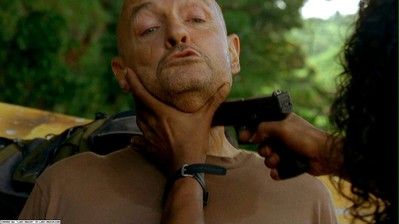
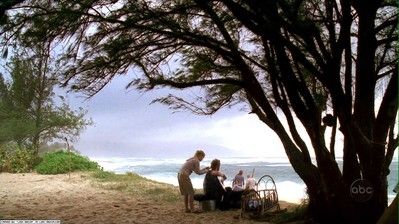
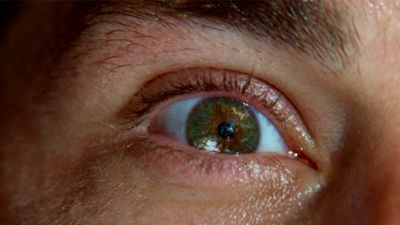
Through Enlightenment one may attain Nirvana, which in direct translation from the Chinese, means "non-doing".
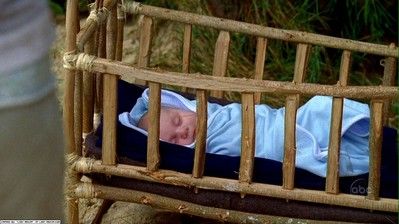
Or in other words: Let go. In all the obsession with Fate and Free Will, I think a lot of LOST’s audience expects some kind of TKO decision in the end, where either Fate or Free Will is the Last Concept Standing, arm held high as the victor. But it’s gone too far for something so simplistic as that. It would be fake to have some contrived act of Free Will overcome the mountains of Fate that we’ve seen throughout the story. Yet no one wants to think that Free Will is useless, that our characters are nothing but puppets in a play controlled by some tapestry weaving puppet master. Since I’m deep into the Eastern theme this week, I’m seeing the Third Way, the way out … dare I say it? The Loophole.

It's as if the only Free Choice that actually exists is the choice to be committed or the choice to Let Go. To detach. From fate. From choice. From karma. From samsara. From the whole bloody vicious cycle. To get out. To find the loophole.
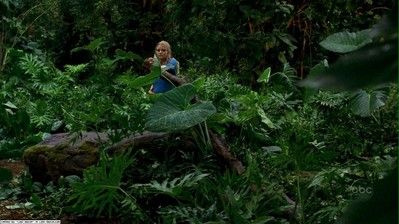
Or as the great Yoda would say:
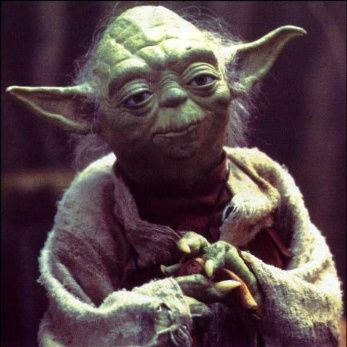
"Train yourself to let go of the things you fear to lose."
Good advice for LOST fans as we enter this final season. The first thing each of us will have to let go of is our personal pet theory of What LOST Means. I've seen theories of LOST that compare the Island to being a brain, or God, or a video game, or a Dr. Moreau style laboratory, or a Dantesque circular netherworld or - my personal favorite - a kind of sexed up version of Rudolph the Rednose Reindeer... you know the claymation version where the Heros have to leave the Island of Misfit Toys, and then come back, after they save Santa Jacob.
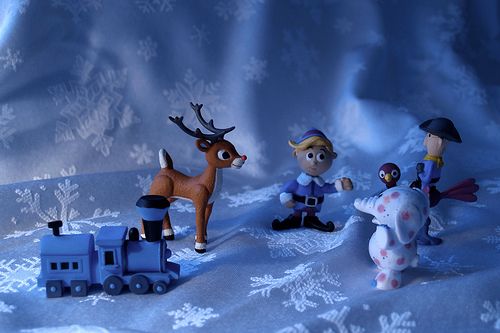
I hate to say it, but it kind of does fit. Plus, I like the holiday theme! Merry Christmas everybody!
We also are now dealing with the fact that when the long awaited Season Six premiere date was finally announced:
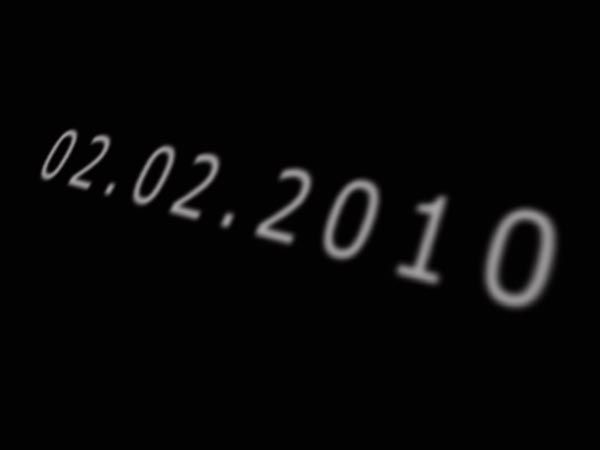
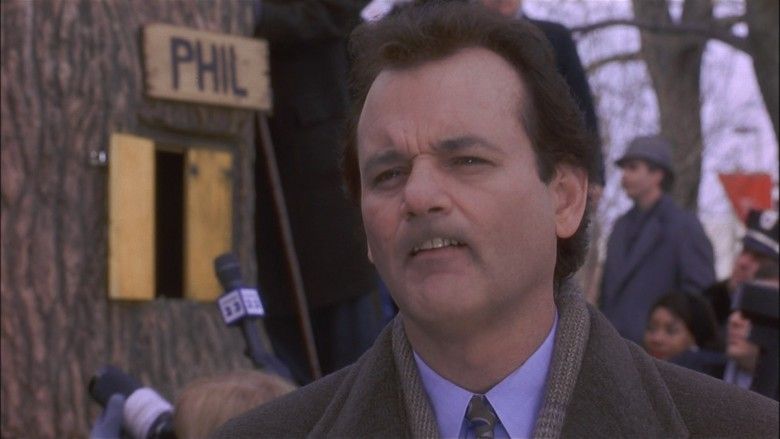


A quarter century later, Jack had still not given up on his quest to FIX! and to SAVE! whatever broken, doomed thing crossed his path.
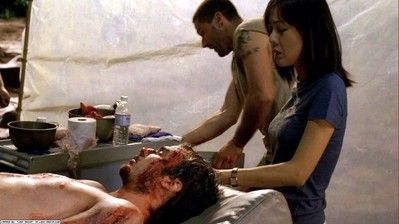
If anything, he was more determined than ever. He went above and beyond in every way trying to save Boone - from inflating his collapsed lung Pulp Fiction style, to wrenching his shattered leg into place without anesthesia, to transfusing him with his own blood through sea urchin spines (!)
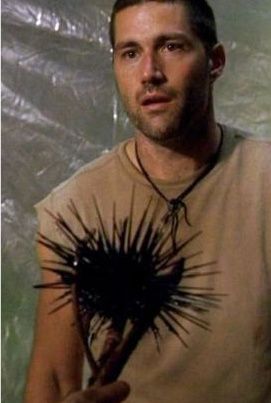
to jury rigging a crude guillotine out of airplane parts so he could amputate the dying man's leg during his final seconds of life. He was committed all right.



Finally Boone had to rouse himself from his own death throes to put a stop to his own gruesome mutilation, to beg Jack to please just make it stop.

Jack had to surrender and to submit. He may have been the finest spinal surgeon ever seen at St. Sebastian Hospital but even the great Jack Shephard could not stop the turning of the inexorable wheel of death and life. Even heroes don't get to be God.

As you may recall, he got rather upset about the whole thing.

But come on, let's give the guy a break. Wasn't he just being a good doctor? Just fulfilling his Hippocratic Oath, as per the title of the episode? I don't know - maybe, maybe not. We'd seen with Sawyer's torture that the Hippocratic Oath wasn't necessarily Jack's top priority, and we'd see it again in the future when the life of Ben Linus was on the line ... back in the past.

One of the things I personally respect about LOST is the way it constantly challenges our preconceptions. Boone's death was juxtaposed not only with birth in Do No Harm, but with sex,


Having sworn to save Boone's life, as Jack was wracked with grief and despair and the crushing realization that he had failed, as Boone gasped out his last ragged breaths,

the scene cut, jarringly, to Jack giving his heartfelt and sincere oath to Sarah. To love her. Forever.



We didn't know what Sarah meant when she thanked her hero Jack for "saving" her. For all we knew it was just a metaphor between lovers. But we knew Jack liked hearing her say it. In fact, hearing it again and again, proclaimed over a public microphone, made him feel all verklempt and moisty eyed and more in love with Sarah than ever.

Sarah's hero worship may well have been the only thing Jack did love about her. And maybe there's the rub. How can being a hero, even wanting to be a hero, ever be a bad thing? To the Western way of thinking, where good and bad occupy mutually exclusive compartments on the opposite ends of a clean and tidy moral universe, heroism falls squarely into the good box. A Buddhist might say that such thinking arises from a false premise. We have convinced ourselves that there are good things and bad things and that all happiness depends on avoiding the one and embracing the other. We are lost in the delusion of duality, of the illusion that black and white are mutually exclusive adversaries, rather than mutually dependent equals.





Jack wasn't the only one chasing the Hero's brass ring. Sayid successfully lured Essam to join the Muslim martyrs as a way to become a Hero for Islam.

Tom Brennan sat straight up and let himself be driven headfirst into a bullet, trying to be a Hero for Katie.


Shannon, unconvinced, tried to become a Hero herself by taking Locke out,




... so that he could die as part of the master plan, for the greater good of his beloved Island.

“It is the greatest good to the greatest number of people which is the measure of right and wrong.” - Jeremy Bentham

But defining "the greater good" isn't always an easy task, as Sayid discovered. Was Nadia's freedom a greater good than Essam's life?

Was helping the US government a greater good than living up to his Muslim ideals? Most importantly, was learning the truth about the hatch a greater good than getting lucky with Shannon?

From the start, Sayid's was the most clouded ethical lens. It was obvious early on that he was eminently corruptible. He was willing to deceive and manipulate his dear friend, who he knew to be a peaceful man grieving inconsolably over his wife's murder.

Sayid's treatment of Essam informed us early on that Sayid had the moral flexibility of a snake. It was unforgivable. Yet he nobly chose to stay behind to arrange for proper funeral honors for Essam, and in doing so, he unknowingly marched right onto the fateful Flight 815.

"Man can do what he wills but he cannot will what he wills." - Schopenauer




At least not yet.

Kate's opening sequence in Born to Run, where the blonde arrives at a no-tell motel and brazenly showers in a stolen room, was a deliberate melange, some say, of scenes from Hitchcock's Psycho.
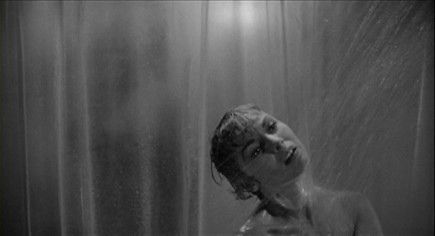
But what's most noteworthy about it to me is the ease with which Kate swings between her many false identities, like a monkey switching from branch to branch as it loops across the jungle sky.
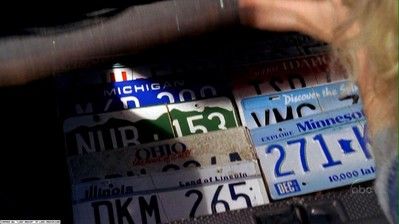
Because she is no one, nothing can really ever be "her" fault.
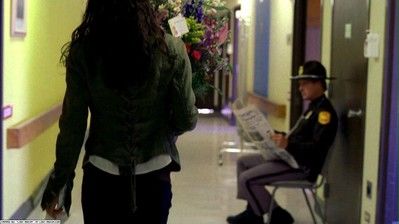
Kate had no particular Self that she had attached herself to. But Karma, both negative and positive, ripples out into the universe and isn't limited to an individual. It can seem unjust. Tom was a good man killed by the karma of Kate's bad deeds. And Kate's bad karma kept rippling outward to injure more innocents, as Tom's death, we were reminded, created yet another fatherless son.





Nadia was the one who suffered the karmic curse of Essam's dying wish, not Sayid.









Some of them did become wicked famous.











look a bit like this part of Jacob's tapestry?




Trying to decipher and decode the clues of LOST is, for me, the biggest fun of being a fan, even if it is completely futile. Five full seasons in and less than two months from the premiere of Season Six, I feel almost as clueless as ever. When Locke tells Sayid that the rest of the survivors "were all so focused on getting off the island that you weren't seeing things clearly", it sounds like a description of the same well set trap that we've all fallen into. We've all been looking and looking so hard we didn't notice we weren't seeing anything.

In Eastern philosophies, the reason that mankind suffers is simple - it is Ignorance that blinds us. On LOST, we are kept ignorant through misleads and bluffs and sleight of hand, as we watch our characters stumble about in the ignorance created by their ever expanding web of secrets and lies. Jack knew that Sun had poisoned Michael because she'd really wanted to poison Jin, but he didn't know that Kate was the poison expert who had taught the herbalist Sun how to go about it - even though Kate had just poisoned him the day before.


It's a question we LOST fans ask ourselves all the time.


Jack took a break from banging John's head into the rocks on the beach and tried instead the novel approach of actually speaking with him. The high holy Jacksus was angry that the big bald liar had not told him about the hatch. Who the hell did Locke think he was?

Locke deftly reminded Jack that he had done the very same thing when he'd taken it upon himself to wrap the key to the guns around his own neck and not let anyone know where he'd hidden them. Touché, Mr. Clean. Well played.

Knowledge is power, after all, and Jack and John's confrontation over who got to control the Island information highway was a great scene, a kind of heavyweight bout between the Island's Alpha twins.

Locke and Sayid's rumble in the jungle had a different feel to it.




Kate managed to wander accidentally into a little truth telling session for herself as well.
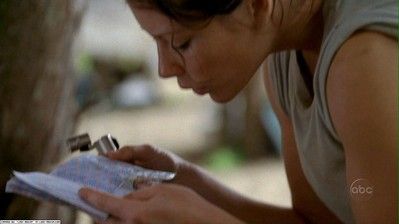
Her clumsy attempt to steal Sawyer's spot on Michael's raft set off a different kind of cat and mouse game. The sexy kind.
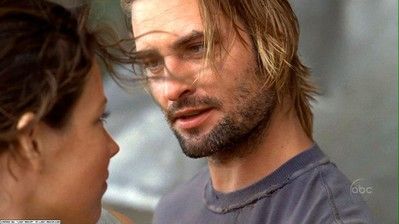
I rewatch scenes like this one and I have to wonder: were there ever actually LOST fans who didn't think these two were fated to hook up?
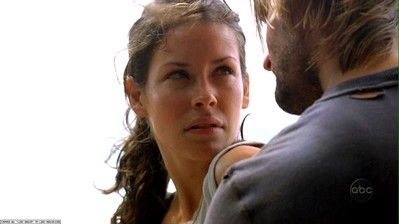
Sawyer saw right through Kate and it seemed like a very big deal at the time when he revealed to the group that she was a criminal, that she hadn't told any of them the truth, that she'd been trying to lie her way onto the raft to avoid recapture.
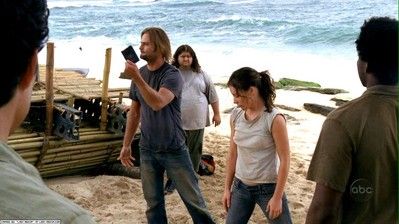
It seemed like after that, no one would like her anymore.
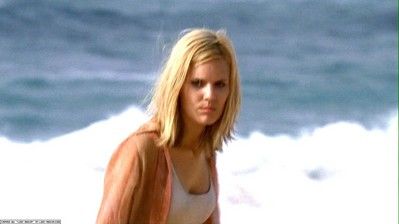
But never fear, it was all forgotten by the next episode. No harm, no foul. Turns out it wasn't such a big deal at all. And besides, it's not as if Kate held it against Sawyer.
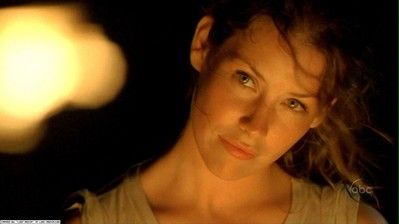
There was a tacit forgiveness on both sides in the beautiful fireside scene, the last that Kate and Sawyer would share together in Season One. Sawyer pulled his best Pacey Witter and tried to get Joey Potter to ask him to stay.
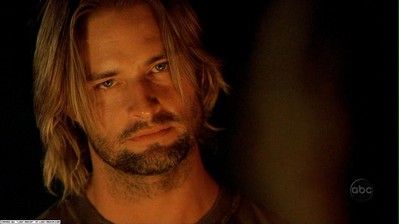
But, alas, she did not.
WE have come to the point in the Reset Rewatch where it's time to start wrapping things up. I'll try and sum it up a bit more after Christmas with the final Rewatch of Exodus, but in this group of episodes I see some patterns that I do believe will be with us in the end.
LOST has toyed with the idea of Resurrection, but they've never actually gone there. Resurrection is an idea that inspires hope in us, I think. Deep down we all love the idea that even if we do have to die some day, we might get a chance to come back ... as our same selves. And when it comes to serial dying, no character on LOST has had more shots at Resurrection than John Locke. In The Greater Good, Locke "dies" for the first, but not the last, time.
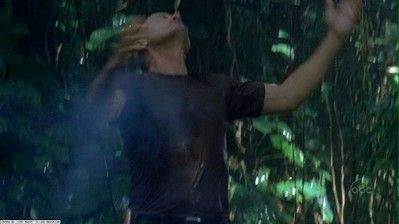
The path to Resurrection lies in Redemption. We see Locke at the waterfall, trying to wash the blood of the innocent off his sparkling white T-shirt.
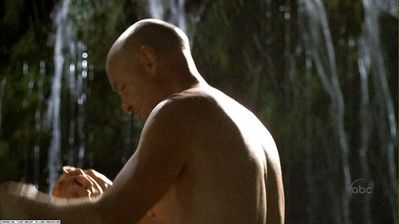
Like Locke's impossible task of ever getting that shirt white again, Redemption on LOST has mostly been a spotty business. The minute someone does something shiney and good, they turn around and do something shitty. And given what has become of John Locke, perhaps it's not Resurrection we should be expecting, but ...

... Reincarnation. Instead of the individual Self being eternal, it is the soul's karma that is eternal, taking ever different forms, higher or lower, in its multiple incarnations through the endless cycle of birth and death. It is confusing to Westerners. We think only how birth is joyful,
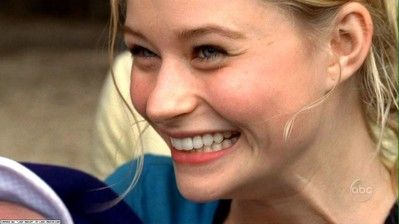
and how death causes such pain.
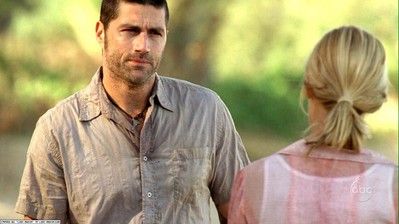
Birth, good thing. Death, bad thing. But the harsh fact is that the sole cause of death ... is birth. Since nothing can exist without its opposite, the source of all that is good, in essence, is evil. What’s a Hero supposed to do in a moral universe where morality itself is absurd?
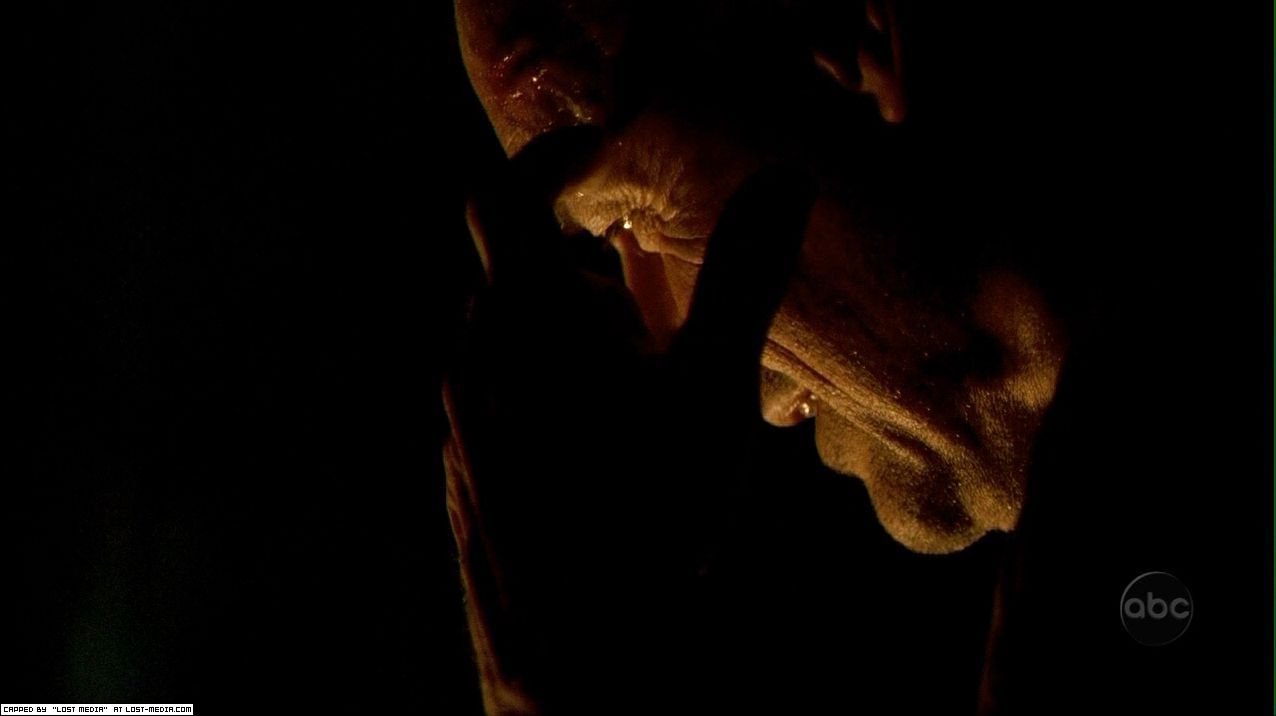
It's interesting that the words "do no harm" don't actually appear in the Hippocratic Oath, as is commonly thought . But Do No Harm is the phrase that Buddhists consider their Golden Rule. It's quite different from the Christian Golden Rule, "Do unto others as you would have others do unto you." Buddhism does not counsel any particular course of action. It counsels Non-action.




It seemed like after that, no one would like her anymore.



WE have come to the point in the Reset Rewatch where it's time to start wrapping things up. I'll try and sum it up a bit more after Christmas with the final Rewatch of Exodus, but in this group of episodes I see some patterns that I do believe will be with us in the end.
LOST has toyed with the idea of Resurrection, but they've never actually gone there. Resurrection is an idea that inspires hope in us, I think. Deep down we all love the idea that even if we do have to die some day, we might get a chance to come back ... as our same selves. And when it comes to serial dying, no character on LOST has had more shots at Resurrection than John Locke. In The Greater Good, Locke "dies" for the first, but not the last, time.



... Reincarnation. Instead of the individual Self being eternal, it is the soul's karma that is eternal, taking ever different forms, higher or lower, in its multiple incarnations through the endless cycle of birth and death. It is confusing to Westerners. We think only how birth is joyful,




Sitting quietly, doing nothingBuddhists seek release from the endless loop of Samsara through the process of Enlightenment, of seeing naked truth directly with fully opened eyes.
Spring comes
And the grass grows by itself.– Basho


Or in other words: Let go. In all the obsession with Fate and Free Will, I think a lot of LOST’s audience expects some kind of TKO decision in the end, where either Fate or Free Will is the Last Concept Standing, arm held high as the victor. But it’s gone too far for something so simplistic as that. It would be fake to have some contrived act of Free Will overcome the mountains of Fate that we’ve seen throughout the story. Yet no one wants to think that Free Will is useless, that our characters are nothing but puppets in a play controlled by some tapestry weaving puppet master. Since I’m deep into the Eastern theme this week, I’m seeing the Third Way, the way out … dare I say it? The Loophole.



Good advice for LOST fans as we enter this final season. The first thing each of us will have to let go of is our personal pet theory of What LOST Means. I've seen theories of LOST that compare the Island to being a brain, or God, or a video game, or a Dr. Moreau style laboratory, or a Dantesque circular netherworld or - my personal favorite - a kind of sexed up version of Rudolph the Rednose Reindeer... you know the claymation version where the Heros have to leave the Island of Misfit Toys, and then come back, after they save Santa Jacob.


... it turned out to be none other than freakin' Groundhog Day! I'm not sure what Groundhog Day really stood for before the great Bill Murray classic was made,

but the only thing "Groundhog Day" means now is a day where everything keeps happening the same way over and over, except for little incremental changes we make each time around. In other words, an endlessly recursive, self referential loop ... with a loophole. Maybe like Phil in Punxatawny, PA, our characters need to keep going around this same circle until they finally get it right. Maybe what Redemption means, in the context of LOST, is finding the Loophole that will let them escape. Until then, everyone just keeps going around in the loop, making a little more Progress each time.
8 comments:
great recap & thoughts, as usual. thanx!
in my own rewatch, i saw again the last few episodes of season 3 recently. when desmond has his last flash of charlie ("you flip the switch, then you drown, and claire & the baby get on the helicopter"). the more i think about it, with the way desmond is acting, telling charlie that he'll take his place to turn the switch off, etc, i think des saw himself get on that chopper, and took the coward way out. he lied to charlie so he could get off this god forsaken island.
we may never know this for sure, but the more i see it, the more it looks this way to me.
Awesome! So much to think about. Thanks for doing these and Merry Christmas to you too. Looking forward to reading you again and again next year.
"were there ever actually LOST fans who didn't think these two were fated to hook up?" - no shit
Aaron fucking Boone...amazing. Never even crossed my mind.
:) Another entertaining review! Have really enjoyed your visitation to S1. Your reviews are the perfect reminder that "with each recursion through the loop, our perspective and understanding of the big picture changes". So much goes on in this story, it's great to see the facts from all seasons laid out in one place, and not alienate one episode or season as an entity unto itself. In other words, you remember the bigger picture Fish, even if the picture doesn't turn out as expected in the end!
Have to mention too that I love your references to Escher (the drawing hands), the Droste effect and the Shepard Tone to illustrate your thoughts on the meaning of it all. Definitely can learn a thing or two on this blog!
- Midnight
Small correction, but although Bentham was a student at Oxford University, his body is actually housed in UCL (University College London) :) x
Ahh. A Pacey reference. Now I know why Sawyer is a fave here. Anyways, it's interesting to see how you turned Jack trying to save Boone's life into a bad thing. In regards to Jack, this blog is like the Fox News of Lost blogs. Spin, spin spin. I do remember Sawyer putting a bullet in the man he though was the real Sawyer. But I guess it's see or hear no evil when it comes to him. That's without mentioning his other indiscretions.
Nevertheless, I like your other ideas here. The out-of-the-way Jack bashing is transparent and old though.
I do remember Sawyer putting a bullet in the man he though was the real Sawyer. But I guess it's see or hear no evil when it comes to him.
If you want to read what Fish thought about Sawyer's crime, maybe you should go read the recap before this one that dealt with that episode. Duh. Fish, I wish you could find a more intelligent breed of bashers.
Pacey reference was spot on btw, Fish. Pretty sure most of the few remaining Jack fans would have been for Fivehead Dawson in a big way. And we all know how that turned out ;)
Brilliant.
Post a Comment